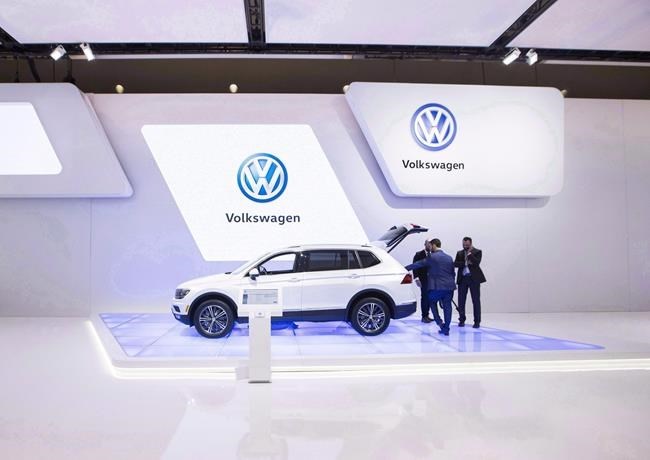OTTAWA — German auto giant Volkswagen has secured an exclusive contract with Canada that could be worth more than $13 billion over the next 10 years to build an electric-vehicle battery plant in southwestern Ontario.
"This is going to be a game changer," Industry Minister François-Philippe Champagne said in Ottawa Thursday.
Champagne made a formal pitch to Volkswagen in Germany last fall, and in March, the company announced it had chosen the city of St. Thomas, Ont., to build its first overseas gigafactory.
The plant, which will be operated by Volkswagen's battery company PowerCo, marks the first manufacturing presence in Canada for the world's largest automaker.
PowerCo chairman Thomas Schmall told reporters a month ago that it looked at 200 different parameters in making its site selection. The United States had an edge on proximity to vehicle manufacturing because Canada has no Volkswagen plant.
But Canada had the edge on raw materials — namely the minerals and metals needed for the batteries — as well as an abundance of clean power.
It was also known that Canada and Ontario had both put money on the table to lure Volkswagen, but until now, neither had disclosed exactly how much. A big announcement is planned Friday in St. Thomas on Friday, where further information, including the expected number of jobs, is expected to be shared.
Champagne provided some of the details ahead of that in an interview with Bloomberg News, and The Canadian Press has verified the information.
The contract will include an upfront capital investment of $700 million and production subsidies for every battery the company makes and sells, amounting up to $13 billion over a decade.
Finance Minister Chrystia Freeland, who was in Pickering, Ont., on a post-budget tour promoting investments in non-emitting electricity, said the budget's big investments, including in the Volkswagen plant, are critical to maintaining Canada's position in the clean-tech industrial revolution.
"I think it's important for us, all of us, to appreciate how significant the economic shift in the world is right now," she said.
"As a government, we are absolutely determined that Canada is going to get its fair share of that new clean industrial economy."
She said that means investing to help build more clean electricity, but it also means keeping Canada as a major car-producing nation.
"That's why the VW investment is so important," she said.
Champagne said Canada will also get its investment back in five years, from the job creation and spill over effects the new plant will have. And only the $700 million is an up front cost.
Nothing else gets spent until the plant is built and making batteries, he said.
"Only if — if and when — they ever produce and sell a cell for a battery ... then you provide support," said Champagne.
The subsidies will not be in the form of tax credits but are designed to match what Volkswagen could have received had it chosen a site in the United States to build its new plant.
The U.S. Inflation Reduction Act, which passed last year, set a new high bar for government investments in clean-tech companies, including electric-vehicle makers and the battery supply chain needed to power them.
A federal source with knowledge of the deal told The Canadian Press the contract with Volkswagen will pay the subsidies based on a formula that matches the U.S. legislation, and that the subsidies will only remain in place as long as that law is in effect.
If at any point the U.S. subsidies on offer decline or are eliminated, Canada's contract with Volkswagen will be amended to reflect that.
When the Volkswagen plant was first confirmed in March, opposition parties were quick to demand an explanation of what Canada was paying for it — and proof it was worth it.
But parties were silent on the matter during question period Thursday and did not ask a single question about the deal.
NDP auto critic Brian Masse, whose riding in Windsor West is among the most heavily dependent on the auto sector, did issue a written statement via email, demanding that the government show how the deal will benefit workers, as well as the company.
"To fight the climate crisis and secure Canada's economic future, Canada needs to be a leader in producing electric vehicles with good-paying union jobs as a requirement for any contracts," he said.
The PowerCo plant will cost $7 billion to construct. It is the third gigafactory the company is building, following the first in Salzgitter, Germany and a second in Valencia, Spain.
PowerCo was just announced last year as a Volkswagen offshoot to make a unified type of battery that can be used in electric vehicles across Volkswagen's brands.
It is expected that the batteries made in St. Thomas will be shipped to Volkswagen's plant in Chattanooga, Tenn., which began making Volkswagen's ID.4 crossover electric SUV last year.
Some of them may eventually also go to a new plant being built in Colombia, S.C., where Volkswagen's subsidiary Scout Motors plans to start making electric trucks and SUVs in 2026.
This report by The Canadian Press was first published April 20, 2023.
Mia Rabson, The Canadian Press



